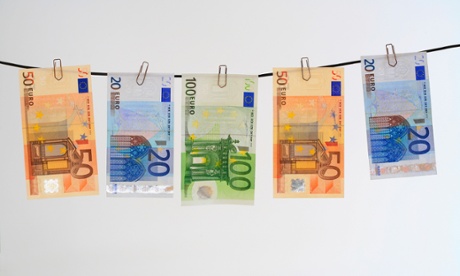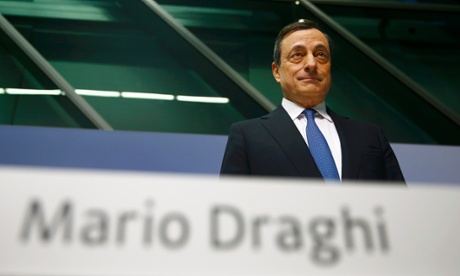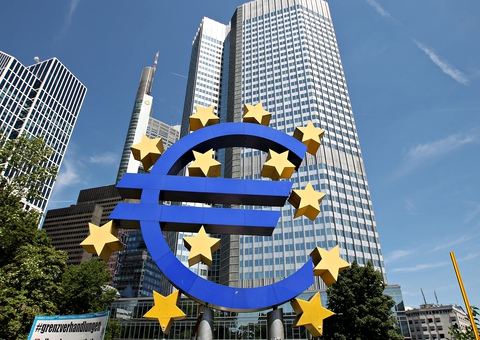The European Central Bank is under growing pressure to step up support for the eurozone’s flagging economy after the bloc slipped back into negative inflation in February.
The surprise drop in prices marked the third time in a year that inflation has turned negative, fanning fears that the eurozone is headed for all-out deflation – a sustained period of falling prices. The news cemented market expectations that the ECB would use its meeting next week to inject fresh cash into the single currency bloc and to cut a key interest rate further into negative territory.
Headline inflation dropped to -0.2% in February, down from 0.3% in January, according to an early estimate from statistics office Eurostat. That contrasted with forecasts for a reading of zero in a Reuters poll of economists.
Low energy prices were the main factor behind the drop, but price pressures in other areas of the economy played a part. There was also a drop in core inflation – taken as a guide to underlying price – adding to signs that low inflation was becoming more entrenched as eurozone economies battled with sluggish global demand from a fresh slowdown and the lingering impact of the last financial crisis.
Core inflation, which excludes the more volatile prices of unprocessed food and energy, fell more than expected to 0.8% from 1% in January and was its lowest since April last year.
Economists said the inflation numbers raised questions over the firepower of central banks to revive growth and prices. Deflation concerns central bank policymakers because it can lead to consumers delaying spending in the anticipation of good becoming cheaper, creating a cycle of diminishing demand that hits economic growth.
This year will be the fourth year of inflation undershooting the ECB’s target of close to 2%, said Anatoli Annenkov, economist at French banking group Société Générale. There were no limits to the ECB’s willingness “but clear limits to its effectiveness”, he said. “Despite its best efforts, the ECB’s challenge to break the backbone of lowflation remains a tall order. Looking set to miss its target for a fourth year this year, we expect it to miss it for another four years, at least, without the help of more substantial economic reform. That won’t stop the ECB from doing what it must according to its self-imposed target, but with markets increasingly unconvinced, we are approaching the ‘effective’ limit of the ECB’s tools.”
The inflation figures follow warnings from the IMF and the OECD that governments cannot rely on low interest rates and money-printing programmes to shore up growth. A weekend meeting of finance ministers and central bank chiefs from the G20 group of countries ended with a similar statement that “monetary policy alone cannot lead to balanced growth”. But the policymakers failed to come up with a concrete plan of how they might revive a sluggish world economy.
The Bank of England governor, Mark Carney, used his speech at the Shanghai meeting to insist central bankers still had ammunition left to boost growth. But he too argued for more help from governments.
This week marks seven years of UK interest rates at a record low of 0.5% and Carney has hinted that he is prepared to cut the base rate further but has ruled out following the trend seen in other countries for negative rates, where depositors are effectively charged for parking their money. The Bank of Japan recently joined the ECB, the Danish central bank, the Swedish Riksbank and the Swiss National Bank in cutting rates to below zero to rescue their economies from deflation and the prospect of recession.
The US Federal Reserve raised interest rates in December, amid signs of a strongly growing US economy. But a string of poor economic figures since then raised doubts about any future rate-rises and even prompted some economists to speculate the move could be reversed.
The ECB meets again next week to decide its next move and its chief, Mario Draghi, has already indicated the central bank will announce moves to inject fresh stimulus into the eurozone. Economists expect the Frankfurt-based body to expand its quantitative easing programme – where it pumps money into the economy by buying up assets from financial institutions – and to further cut its deposit rate by 10 basis points to -0.4%. Another reduction in the deposit rate means it would be charging banks more to hold their money overnight.
The weak core inflation figure “pretty much seals the deal on additional monetary easing” at next week’s meeting, said Teunis Brosens at ING bank. “The weakening of core inflation shows the real and present danger that cheap oil will cause low inflation to become ingrained in eurozone price and wage dynamics. This is especially bad for debt-laden households, businesses and governments in Southern Europe, which will have little scope to ‘inflate away’ their debt burden by increasing nominal wages,” Brosens said.











